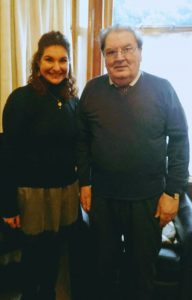The day I met John Hume
 You never think it will happen to you, until it does.
You never think it will happen to you, until it does.
Leaders around the world, former colleagues, and friends have described him as Ireland’s ‘most significant and consequential political leader’ of the 20th century. In the 1970s and 1980s, reports by United Kingdom (UK) civil servants show him to be a thoughtful, determined, and skilful politician. They say that he always kept his eyes firmly fixed on the long-term goal of a settlement that would end the conflict in Northern Ireland. He was – and he is, now more than ever – known for being the architect of the Peace Process, for being centrally involved in the civil rights movement of the 1960s, and for having served as an MP and as an Assembly member. I knew him, and I devoted years of my life to learn about his work as a Member of the European Parliament (MEP). This was the side of his story that had yet to be told.
What was Hume like for his colleagues in Brussels? He was described to me as almost always on his way to or from an interesting engagement. They all said that he was very discreet. He told you what he thought you needed to know about the big picture (usually very little) and that was that. He had great focus and concentration. If you gave him a text or a draft that was of interest, he would almost grab it off you and read it intensely, usually in an unnerving silence. He would break off his conversation with you to talk to someone else. He operated with great conviction, confidence, and commitment. He was always alert to what was happening in the European Commission and how it could relate to Northern Ireland. He had a strong support office, with Denis Haughey covering European issues.
He had a warm straightforward style and he was constantly being buttonholed by people. He was very well liked and respected and ended up with a very strong support network throughout Brussels and Strasbourg. I once mentioned his name during an interview with a French European Commissioner: ‘Ah Hume, c’était un chic type!’ was the reply. Some of this was apparently down to his personality. My research taught me that it was also because people wanted to help with what was happening in Northern Ireland.
I woke up in Derry, on that December morning of 2017, thinking ‘it is actually happening to me’. I took a cab to the address I was given by his wife, Patricia. The driver told me, with a smile, ‘this is John Hume’s address’. Proudly, I said, ‘that’s where I am going’. It was a special day for me. My journey had not just started from Galway the day before. It had started years before, in a little village in the middle of the Alps, when I was learning all the names of the Nobel Peace Prize laureates. People did not know about Northern Ireland (I taught them years later…). People did not think you will, one day, meet an extraordinary man.
I knocked on the door wondering if I would meet him, or if I would only meet Patricia, as I knew he was ill. I realised I was shaking, when I saw him behind the door. People have said, following his death, that the ‘Irish nation has lost a giant of its history’ and I distinctively recall having thought the same when I saw him: ‘he is a giant’. We spoke French. He tried to pronounce my name correctly, succeeding at the third attempt. He smiled when I gave him my gift: a bottle of the best Gewurztraminer I could find (I was told it was his favourite wine). I was welcomed by the lovely smile of Patricia, who then guided me to where we could speak.
On that day, I was told the story of an extraordinary man, and when I was asked ‘why does a young woman from Italy want to know about Northern Ireland?’, I replied: ‘because I want to be able to tell the world the story of the extraordinary men who made peace possible in this beautiful place’. I got back to Galway, with my gift in my hands: a signed book, a copy of his 1998 speech, and a picture we took together that I knew I would always treasure. What I did not know was that I would, one day, tell his story to young students and to people asking me about Northern Ireland and about ‘the day I met John Hume’.
Giada Lagana
Dr Giada is a Research Assistant at the Wales Institute of Social and Economic Research and Data (WISERD), School of Social Sciences, Cardiff University. She was also recently awarded a Simone Veil Fellowship at LMU-Munich for her research on EU peace-building. She has previously worked at the Wales Governance Centre on the ESRC ‘Between Two Unions’ project with Professor Daniel Wincott, examining the impact of the United Kingdom’s (UK) withdrawal from the European Union (EU) on the UK’s internal constitutional and intergovernmental arrangements. She has published the book The European Union and the Northern Ireland Peace Process (Palgrave McMillan). Giada started out as an historian, completing her undergraduate studies in modern and contemporary history at the University of Pavia (Italy). She then obtained an MA in international relations and history, under the joint supervision of Didier Poton (Université de La Rochelle) and Michel Catala (Université de Nantes).

